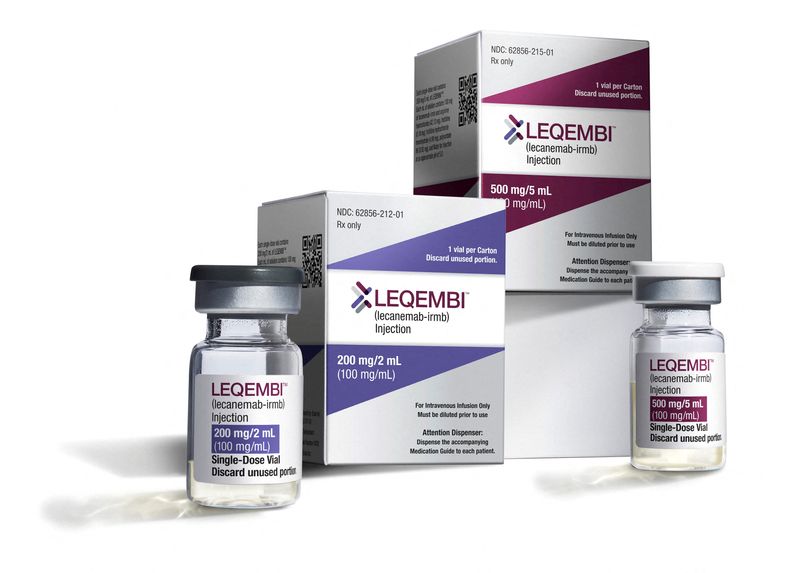By Julie Steenhuysen
(Reuters) -The U.S. Medicare health plan said on Thursday it would limit reimbursement for Eisai Co (OTC:ESAIY) Ltd and Biogen Inc (NASDAQ:BIIB)'s Alzheimer's drug Leqembi to patients whose doctors participate in a health agency database should the drug win full approval, a move advocates say will hinder its use.
The decision marks the first time that Medicare has required data-collection through a so-called registry for the intended use of a drug that has been deemed safe and effective by the U.S. Food and Drug Administration.
Leqembi received accelerated approval from the FDA in January, based on limited evidence suggesting it would slow cognitive decline in early Alzheimer's patients. A panel of FDA advisers will discuss whether Leqembi should receive traditional approval next week, and a decision could come by early July.
Medicare, the government health plan for Americans 65 and over, currently pays for Leqembi only if patients are enrolled in a clinical trial. The agency said the registry requirement would broaden access to the drug.
It would require doctors to submit evidence on how the drug works in routine practice, and collect information in an "easy-to-use" portal maintained by the Centers for Medicare and Medicaid Services (CMS) upon traditional approval.
The CMS decision would apply to all Alzheimer's treatments that reduce a protein called beta amyloid from the brain, including Eli Lilly (NYSE:LLY) and Co's donanemab, which recently reported positive results from its late-stage trial.
"Until CMS announces the registry design and details, it is difficult to understand how a registry will impact patient access to Leqembi," Eisai said in a statement. Historically, such programs have limited access to patients in underserved communities, the company added.
Lilly called on CMS to revise its decision and urged the agency to provide full Medicare coverage for FDA-approved Alzheimer's medicines, saying the move would set a precedent for all new medicines.
"We strongly believe that mandating patient enrollment in registries will continue to pose unnecessary barriers and contradicts CMS' promise of broad coverage to all Medicare beneficiaries," a Lilly spokesman said in a statement.
In April, Lilly said it believed Medicare would back down from its registry requirement as more evidence emerged showing that clearing amyloid brain plaques can help patients.
Such "coverage with evidence development" requirements are rare and historically used by Medicare to evaluate medical devices rather than drugs.
"We continue to believe that registry as a condition of coverage is an unnecessary barrier," the Alzheimer’s Association said in a statement. The group said it supports collecting information on how such treatments work, but not as a requirement for coverage of an FDA-approved drug.
Biogen's shares were 2.6% higher, while Eli Lilly was up 1.3%.
Duke University economist Dr. Mark McClellan, who has served both as FDA commissioner and a CMS administrator, said it appears CMS is trying to make the registry less cumbersome, but that it must provide more details. "That needs to happen pretty quickly."
To receive Medicare coverage, people will need to be diagnosed with mild cognitive impairment or early dementia caused by Alzheimer's and have a qualified physician participating in a registry.

William Blair analyst Myles Minter did not see the registry requirement significantly limiting patient access. "We believe that registries at specialist centers where Leqembi is likely to be initially administered will not be a substantial hurdle."
A CMS spokeswoman said the initial registry will be administrated by the agency should Leqembi gain full approval and was hopeful other organizations would create additional registries to collect data.